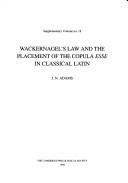| Listing 1 - 4 of 4 |
Sort by
|
Book
ISBN: 9516410693 Year: 1974 Publisher: Turku : Turun Yliopisto,
Abstract | Keywords | Export | Availability | Bookmark
 Loading...
Loading...Choose an application
- Reference Manager
- EndNote
- RefWorks (Direct export to RefWorks)

ISBN: 0906014174 9780906014172 Year: 1994 Volume: 18 Publisher: Cambridge Cambridge philological society
Abstract | Keywords | Export | Availability | Bookmark
 Loading...
Loading...Choose an application
- Reference Manager
- EndNote
- RefWorks (Direct export to RefWorks)
Esse (The Latin word) --- Latin language --- Etymology --- -Classical languages --- Italic languages and dialects --- Classical philology --- Latin philology --- Etymology. --- -Etymology --- Esse (The Latin word). --- Latin language - Etymology
Book
Year: 1965 Publisher: Bonn : Universität, Romanisches Seminar,
Abstract | Keywords | Export | Availability | Bookmark
 Loading...
Loading...Choose an application
- Reference Manager
- EndNote
- RefWorks (Direct export to RefWorks)
Esse (The Latin word). --- Latin language --- Romance languages --- Word formation. --- Word formation.
Book
ISBN: 9780198736240 019873624X 0191799904 Year: 2015 Publisher: Oxford Oxford University Press
Abstract | Keywords | Export | Availability | Bookmark
 Loading...
Loading...Choose an application
- Reference Manager
- EndNote
- RefWorks (Direct export to RefWorks)
"Terence and the verb 'to be' in Latin is the first in-depth study of the verb 'to be' in Latin (esse) and some of its hidden properties. Like the English 'be' (e.g. it's), the Latin forms of esse could undergo phonetic reduction or contraction. This phenomenon is largely unknown since classical texts have undergone a long process of transmission over the centuries, which has altered or deleted its traces. Although they are often neglected by scholars and puzzling to students, the use of contracted forms is shown to be widespread and significant. These forms expose the clitic nature of esse, which also explains other properties of the verb, including its participation in a prosodic simplification with a host ending in -s (sigmatic ecthlipsis), a phenomenon which is also discussed in the volume. After an introduction on methodology, the volume discusses the linguistic significance of such phenomena, focusing in particular on analysis of their behaviour in the plays of the ancient Roman playwright, Terence.0Combining traditional scholarship with the use of digital resources, the volume explores the orthographic, phonological, semantic, and syntactic aspects of the verb esse, revealing that cliticization is a key feature of the verb 'to be' in Latin, and that contractions deserve a place within its paradigm."-- dust jacket
Esse (The Latin word) --- Latin language --- Abbreviations, Latin --- Verb --- Abbreviations, Latin. --- Language and languages. --- Verb. --- Terence --- Terence. --- Language. --- Latin language - Verb
| Listing 1 - 4 of 4 |
Sort by
|

 Search
Search Feedback
Feedback About UniCat
About UniCat  Help
Help News
News